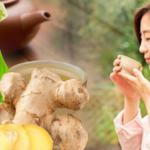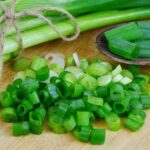What is the benefit of placing a ginger root at the bedside?

One of the popular tips is to place a ginger root at the bedside.
This brings about the following advantages:
Sedative, Sleep Aid
One of the primary reasons why many people place ginger at their bedside is its calming properties and ability to promote sleep. The aroma of ginger has a soothing effect on the nerves, relaxing the mind and reducing stress and anxiety. Having ginger by your pillow can create a pleasant atmosphere, making it easier to fall asleep and improving sleep quality.
Air Purification
In addition to aiding sleep, ginger also possesses deodorizing and air-purifying qualities. Placing ginger at the bedside helps eliminate unpleasant odors in the room, creating a more pleasant environment. Furthermore, ginger has antibacterial properties, inhibiting the growth of bacteria and mold, thus contributing to cleaner air.
Relieves Congestion
Individuals prone to colds, flu, and nasal congestion may also benefit from placing ginger at their bedside. The spice’s aroma helps clear the nasal passages, and its anti-inflammatory properties ease breathing. A 2020 study revealed ginger’s anti-allergic and anti-inflammatory capabilities, suggesting that daily exposure to its fragrance is beneficial for overall health.
Enhances Libido
Scientific research indicates that ginger’s distinctive aroma comprises zingiberene and bisabolene. These compounds contribute to its spicy fragrance. The scent of ginger reduces feelings of loneliness and increases desire, particularly in the context of intimate relationships, thereby inspiring couples. As such, placing ginger at the bedside can kindle marital passion.
Repels Insects
Another benefit of the habit of placing ginger at the bedside is its ability to repel insects, especially mosquitoes. While the distinctive aroma of ginger is pleasing to humans, it elicits fear in certain insects. For households with young children, using ginger as a mosquito repellent is a safe alternative to chemical products that may pose health risks.
Optimal Placement of Ginger at the Bedside
While many individuals place the entire ginger root at their bedside, this may not be the most effective approach. To maximize the release of its fragrance, consider slicing the ginger into thin pieces or mincing it, then placing the pieces in a cloth bag, securely tied shut.
Alternatively, you can reuse disposable masks by cutting ginger into small pieces and placing them inside, using the ear loops to secure the mask shut. Hang this ginger pouch at the bedside or under the pillow to diffuse its aroma.
Precautions When Consuming Ginger

What is the benefit of placing a ginger root at the bedside, and why do so many people do it?
First and foremost, moderation is key.
During the summer, our bodies tend to lose more water. Ginger, being a typically spicy and hot food, should not be consumed in excess. When cooking or preparing beverages, a few slices of ginger are sufficient; there is no need to overuse this ingredient.
Second, even good things have their limitations.
Fresh ginger cooked with red sugar is commonly used to treat wind-cold, colds, and stomach coldness.
However, ginger itself is hot in nature and is only suitable for treating illnesses caused by cold energy. Therefore, those suffering from heatstroke or wind-heat-induced colds should refrain from using ginger remedies.
Third, don’t peel the ginger!
Many people, when preparing ginger, tend to peel it, believing it to be more hygienic. However, removing the outer layer diminishes the full potential of ginger’s effectiveness.
Fourth, discard spoiled ginger.
Ginger that has deteriorated (bruised, rotten, or sprouted) can produce potent toxins, leading to cell necrosis and potentially causing severe illnesses such as liver and esophageal cancer.
Fifth, ginger is not for everyone.
Due to its spicy and hot nature, ginger may not be suitable for individuals with certain conditions. These include those with yin deficiency and yang excess, internal heat, boils, sores, or open wounds.
Similarly, individuals with specific lung conditions (pneumonia, lung abscesses, lung pus, or tuberculosis); stomach ulcers; kidney problems (ruptured or inflamed kidneys); gallbladder inflammation; diabetes; or hemorrhoids should refrain from excessive ginger consumption.



































